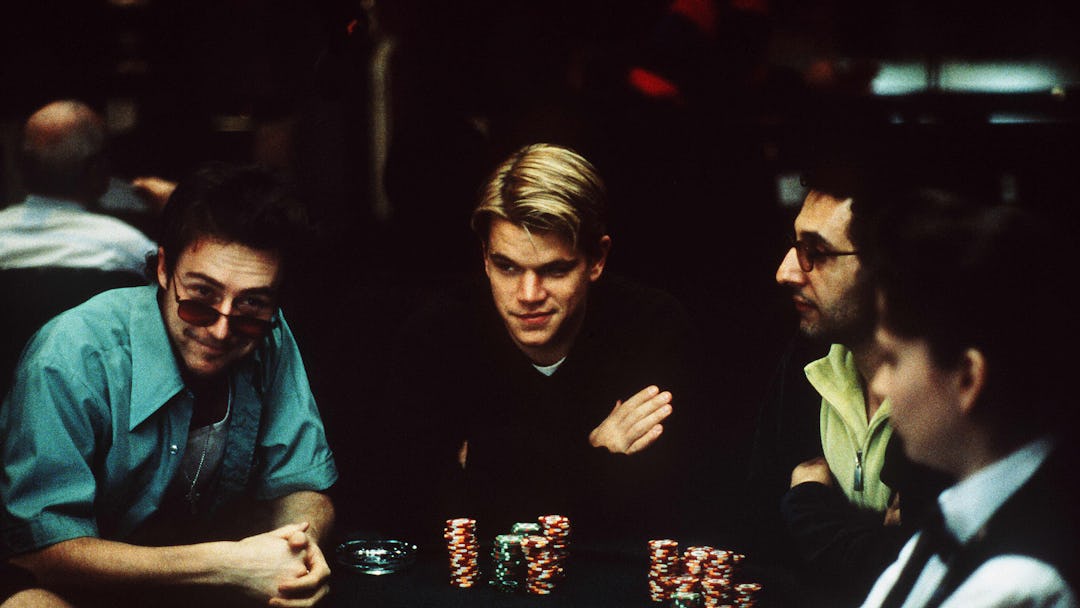When Rounders hit theaters 15 years ago today, it looked like the next giant hit for mini-major Miramax. The star was Matt Damon, fresh off his Oscar win for Good Will Hunting, and the trailers (showcasing a scene in which his poker savant blind-reads a table of judges’ hands) did their level best to remind viewers of that connection. Damon’s co-star was Edward Norton, still flying high from his 1996 nomination for his film debut, Primal Fear. The female lead, Gretchen Mol, was an unknown, but a Vanity Fair cover that very month asked, “Is she Hollywood’s next ‘It’ Girl?” The supporting cast was loaded with terrific character actors, including John Turturro, Martin Landau, Famke Janssen, and John Malkovich. The director was John Dahl, who’d directed the moody indie fave The Last Seduction. It looked like a surefire hit. And then it was released… and it tanked.
Reviews were mixed, and though it topped the box office that opening weekend, it did so with a weak $8 million; it would only make a total of $22 million in its entire, short run (compared to Hunting’s $138 million). Damon moved on to The Talented Mr. Ripley. Norton went to Fight Club. Celebrity, the Woody Allen movie that Vanity Fair was also hanging Mol’s “’It’ Girl” star on, did similarly underwhelming business, and the young ingénue spent years trying to shake the magazine’s premature label. But years later, thanks to DVD, Rounders finally, quietly found its audience.
In retrospect, it may have just been a couple of years ahead of its time. In the early 2000s, No Limit Texas Hold-‘Em — the primary game played in Rounders, “the Cadillac of poker,” per Damon’s voice-over — underwent a massive popularity boom, buoyed by the television broadcasts of tournaments and shows like Celebrity Poker Showdown. Rounders wasn’t lucky enough to be released in the midst of that — but it did move plenty of DVDs, and Miramax was happy to oblige by re-releasing the movie in a 2004 “Collector’s Edition,” with the generic star beauty shots of the original slipcover supplemented this time by copious poker paraphernalia. (Fads are unforgiving to the slow pace of film production; by the time “poker movies” like Lucky You and The Grand hit, the fuss was all over.)
But Rounders’ belated success wasn’t just a matter of timing. The film poker fans discovered didn’t just exploit their sport as a hook for easy atmosphere; it was a movie that felt written from inside those rooms, that knew not just the tricks and the shorthand, but the way it felt to spend hours in that smoke, desperately waiting for the cards to fall your way. Though plenty of real poker players approved of the movie, and many future players would say the film piqued their interest in the game, most of those who loved the film, who memorized its dialogue and picked up its slang, would never be in one of those rooms or go on a desperate run like Mike and Worm’s; they were closer to the Atlantic City tourists that get rolled by the professionals.
But the film feels like a dispatch from that world. It’s as slang-loaded as any science fiction film (“three stacks of high society,” “Fourth Street,” “I flopped the nut straight,” etc.); even the casual exchanges have the circularity and street smarts of a good David Mamet play (“But about the money, I gotta say this: I gotta say no”). The most vivid and most enjoyable movies immerse us in a world, and show us how that world works. The screenplay by David Levien and Brian Koppelman (Ocean’s 13) does that; Dahl’s direction closes the deal.
Then again, maybe it’s all about Teddy KGB. In a film filled with memorable performances — Norton’s oily perpetual fuck-up Worm and Turturro’s understanding, play-it-safe Joey Knish chief among them — Rounders gives us John Malkovich at his most John Malkovich-y. Sporting a Russian accent that makes Boris and Natasha’s seem nuanced, joyfully “splashing ze pot” and chewing his Oreos (a tell whose easy interpretation is one of the film’s few unbelievable elements), Malkovich’s work shows the value of a small role from a reliable utility player — there’s no way we’d buy this guy as our lead, but bring him in for two scenes and he’ll blow the joint up.
Since the early days of VHS, the power of an ancillary audience to discover an overlooked gem and prop it up has been one of home video’s greatest virtues. When Rounders didn’t turn out to be Good Will Hunting II, it was written off as a failure. But the subsequent years have been exceedingly kind to this snappy, sharp, fast, and funny picture, suggesting that (contrary to the film’s opening lines) it didn’t turn out to be the sucker at the table after all.
